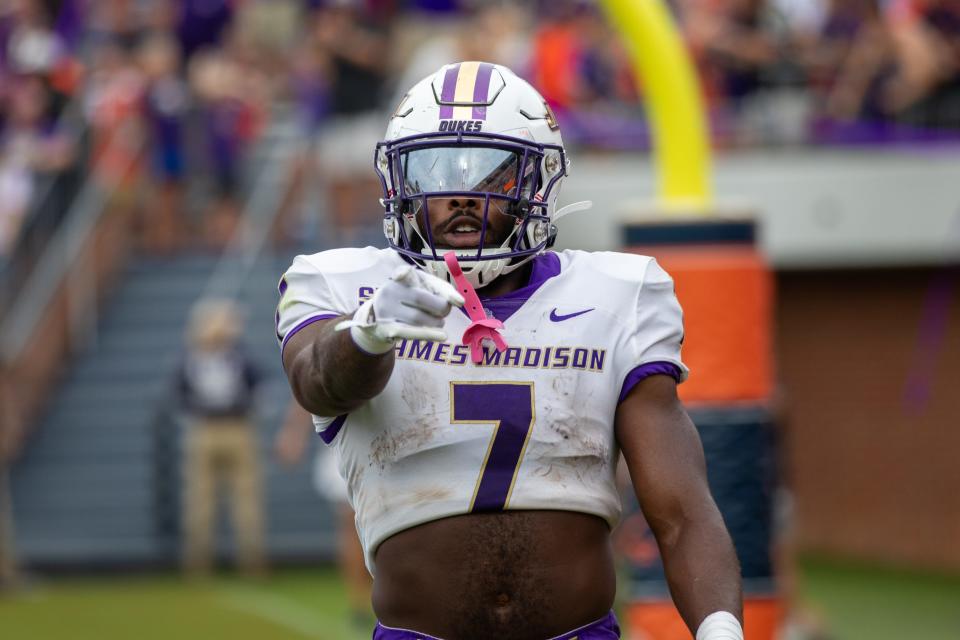NCAA president says he feels bad for James Madison football players, but rules are rules
PULLMAN, Wash. – NCAA President Charlie Baker said he feels “bad” for the undefeated football players at James Madison University but said it wouldn’t be fair to give them a waiver from an NCAA rule that prevents them from being eligible for postseason play this season.
“Yeah, I feel bad for those kids, but I also feel bad for the kids who play for a team that is eligible that would not make it” if JMU got a waiver, Baker said in an interview Friday with USA TODAY Sports.
Baker said those other eligible schools could suffer potential damage if the Dukes (10-0) were given the waiver to play in the postseason. He named Liberty (10-0) and Tulane (9-1) as among those who could be boxed out of a top bowl in that case.
“It’s a zero-sum game,” Baker said Friday at Washington State University, where he was visiting. “If you put more and more in, it’s not like there’s another space for more and more. Somebody else comes out, who’s qualified and isn’t on probation.”
WEEK 12: College football bold predictions for Week 12
Why aren’t the Dukes eligible to play in a bowl game?
They are in the midst of a two-year transition to the lucrative Football Bowl Subdivision (FBS) of college football after moving up from the Football Championship Subdivision (FCS), where there are fewer resources and player scholarships. The NCAA requires such “reclassifying” teams to be ineligible for the FBS postseason during this two-year period.

The Dukes are in the second year of the transition and have asked for a waiver from the NCAA but have been denied. If their waiver request had been approved, they could have been included in the College Football Playoff rankings and might have set their sights on an elite bowl game.
NCAA President cites another example
Baker likened the case of the Dukes to that of Merrimack College in Massachusetts, where Baker previously served as the state’s governor. In March, Merrimack won a conference tournament title in men’s basketball but wasn’t allowed to play in the NCAA tournament because it was in the final year of a four-year transition from Division II to Division I. Fairleigh Dickinson represented the Northeastern Conference instead despite losing to Merrimack, 67-66.
In James Madison’s case, if the Dukes got a waiver, Baker said it wouldn’t be fair to those who might lose out on a bowl berth because of it after “playing all season with the understanding that they were playing to be in a bowl.” By contrast, James Madison knew they would be ineligible no matter how well its season went.
Baker noted the Dukes still could end up in a bowl game through the backdoor if there aren’t enough teams with the minimum record of 6-6 to qualify. In that case, they would be allowed to fill an open spot as needed, likely in a lower-tier game as opposed to the kind of top bowl game they could be shooting for now in the CFP rankings if granted a waiver.
What is the point of the rule?
Baker acknowledged the rule should be reexamined. It was essentially designed to prevent teams from making a hasty move up the ladder in college sports to the detriment of its teams and support staff.
But the advent of players transferring freely between schools and other big recent changes in college sports “probably means that at this point and time we should take a look it going forward,” Baker said. “But I have no problem with the rule as it stands.”
Such requirements and restrictions for reclassifying teams “are based on factors beyond athletics performance,” the Division I Board of Directors Administrative Committee said in a recent statement. "They are intended to ensure schools are properly evaluating their long-term sustainability in the subdivision. Sponsoring sports at this level requires increased scholarships, expanded athletics compliance efforts, and additional academic and mental health support for student-athletes, and the transition period is intended to give members time to adjust to those increased requirements to position student-athletes at those schools for long-term success.”
After facing Appalachian State Saturday, James Madison plays its regular season finale a week later at Coastal Carolina.
Follow reporter Brent Schrotenboer @Schrotenboer. Email: bschrotenb@usatoday.com
This article originally appeared on USA TODAY: Why the NCAA president says James Madison team shouldn't get a pass

